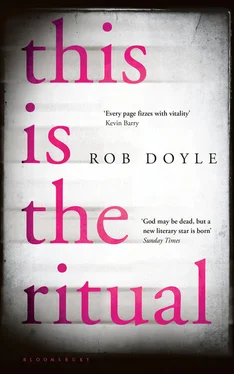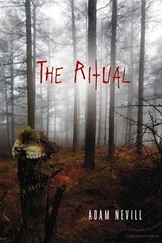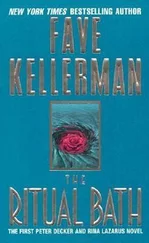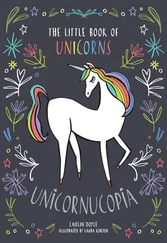Rob Doyle - This is the Ritual
Здесь есть возможность читать онлайн «Rob Doyle - This is the Ritual» весь текст электронной книги совершенно бесплатно (целиком полную версию без сокращений). В некоторых случаях можно слушать аудио, скачать через торрент в формате fb2 и присутствует краткое содержание. Год выпуска: 2016, Издательство: Bloomsbury Publishing, Жанр: Современная проза, на английском языке. Описание произведения, (предисловие) а так же отзывы посетителей доступны на портале библиотеки ЛибКат.
- Название:This is the Ritual
- Автор:
- Издательство:Bloomsbury Publishing
- Жанр:
- Год:2016
- ISBN:нет данных
- Рейтинг книги:5 / 5. Голосов: 1
-
Избранное:Добавить в избранное
- Отзывы:
-
Ваша оценка:
- 100
- 1
- 2
- 3
- 4
- 5
This is the Ritual: краткое содержание, описание и аннотация
Предлагаем к чтению аннотацию, описание, краткое содержание или предисловие (зависит от того, что написал сам автор книги «This is the Ritual»). Если вы не нашли необходимую информацию о книге — напишите в комментариях, мы постараемся отыскать её.
This is the Ritual — читать онлайн бесплатно полную книгу (весь текст) целиком
Ниже представлен текст книги, разбитый по страницам. Система сохранения места последней прочитанной страницы, позволяет с удобством читать онлайн бесплатно книгу «This is the Ritual», без необходимости каждый раз заново искать на чём Вы остановились. Поставьте закладку, и сможете в любой момент перейти на страницу, на которой закончили чтение.
Интервал:
Закладка:
I thought hard on the course of that long, not to say interminable walk. I decided it was foolish to put myself under the impossible obligation of reading the entire nineteenth century before writing about Nietzsche — better to launch headlong into the writing itself, hurl myself at the project with a warlike and fearless mentality. (The image in my mind, for better or worse, was of kamikaze pilots slamming into an iceberg.) In the grip of these thoughts, while traversing the Heath for perhaps the eighth or ninth time as the sunny afternoon gave way to an overcast and chilly evening, I found myself reflecting on my first encounter with Nietzsche, more than a decade earlier. I had discovered Nietzsche’s work in a cubicle in the men’s toilets in the Dublin Mail Centre, a colossal, grey building in a business park in Clondalkin, where I worked for three awful years starting when I was nineteen, a period when I was dangerously depressed, impervious to all but the most experimental of medications. I hated the place, hated the people, hated myself for being there. The DMC felt to me like a concentration camp or a prison colony out of dystopian science fiction. The incessant noise of the mail-sorting machines made conversation impossible, which was just as well, considering that the workers who’d manned the machines for years and decades were such mindless, half-demented cretins. Bitter and resentful of everything, I calculated that, for at least an hour during each of my four-hour shifts, I could remove myself unnoticed from the workstations and hide in the toilets, where I was able to read. Reading, I felt, would partly justify my having to be in that horrible building, giving my time to those wretched machines and their wretched human overseers. With the machines screaming outside the toilet doors, I settled in and began reading Nietzsche, getting through The Antichrist, Human, All Too Human, Twilight of the Idols, On the Genealogy of Morals , and half of Thus Spoke Zarathustra over a period of several months. I should have quit the place, but the psychoanalyst I was seeing advised against making any major changes in my outward life, especially ones which would feed into what he saw as my dominant, dangerous tendency: withdrawing from human society into solitude, into silence, into stinking toilet cubicles.
As I paced across the Heath, I grew more certain that the only hope I had of writing something honest, vital and true about Nietzsche lay in attacking the project in a more personal, urgent, even autobiographical manner — to write in blood , in Nietzsche’s own words. Perhaps, I thought, I should even write about that vile and stinking toilet in the Dublin Mail Centre, in order to discover what that said about Nietzsche, or about the post-Christian epoch more generally, if it said anything at all. It might even be possible, I thought, growing increasingly excited by the idea as I tramped over the Heath, to frame my study of Nietzsche around the image of that stinking toilet, which would speak eloquently to any discerning reader of the death of God, the putrefying carcass of God, not to mention the cauldron of depravity and hate underlying Christian slave morality. The filthy toilet was Christian morality itself , it seemed to me then, tramping across the Heath. I returned to the flat late that evening greatly relieved, with the sense I had finally discovered a way in to my project. I resolved that, as soon as I left London and began my travels in Europe, I would begin writing in blood . I slept soundly that night for what felt like the first time in months.
A few days after that interminable walk on the Heath, Natasha called to tell me that her mother had died. The illness had developed more rapidly than anyone had anticipated, finally proving fatal. Needless to say, Natasha would now be staying in Russia for considerably longer than she had intended. Towards the end of our conversation, she told me in a low, tired voice that it might make sense if I were to begin my ‘Nietzsche journey’ alone, and she would join me later on, perhaps in Turin.
At this point, just when it was most crucial for me to save money so that I could get away from the wretched Hampstead flat which had begun to feel like a tomb, or like the inside of my own skull, the philosophy tutoring work I had been relying on inexplicably dried up. Alarmed, I emailed the tutoring agency, but my queries went unanswered. I called the office but everyone I spoke to was vague and evasive, suggesting that responsibility lay elsewhere. The suspicion grew in me that this sudden, drastic diminishment in my employment (admittedly precarious at the best of times) was related to a regrettable and worthless story of mine which had been published a couple of years previously in a scarcely credible online ‘literary journal’. The story concerned a drug dealer who spent his days hovering on the fringes of parks and children’s playgrounds, often masturbating furtively in the bushes, or just squeezing his balls through his trouser pocket. By night he wrote hate-fuelled tracts about ‘redneck hordes’, ‘girly-girls’ and ‘demon queers’, which he posted to Bashar al-Assad, Gerry Adams and Kanye West, neither expecting nor receiving any response. In what I had considered a daring post-modern flourish, I named this hateful and charmless character after myself, though he had nothing in common with me beyond his addiction to salt and vinegar Pringles and an uncontrollable twitch in his left eye. The story, ‘Permanent Erection’, had been written and submitted in a single evening while I was hammered on red wine, and had afforded Raoul and me a night of fantastic cackling. However, as soon as I had sobered up I realised that publishing this story online, and framing it in such a way that the reader might assume it expressed my own true, shameful fantasies, or else was straightforwardly autobiographical, might not have been the wisest of moves. In a series of increasingly frantic emails to the journal’s editor, I attempted to retract the story and have it taken off the internet. None of these emails was even acknowledged. It dawned on me that the online journal had been abandoned after its first issue, and no one was going to bother taking the site down.
Now that my sole source of income had gone dry, and with Natasha on unpaid leave in Russia, giving no indication as to when she might return (‘we are a close family,’ she muttered frostily over the phone, implicitly criticising my own indifference to family), I realised that it would not be possible to leave London as early as I had hoped. After another long walk on the Heath, I decided there was nothing for it but to hurl myself into my Nietzsche project there and then, in our dingy flat in Hampstead, rather than wait till I got to Turin. Hurl myself into it , I repeated, standing before the mirror or lying in bed in the morning. Hurl myself into it . At first it was a kind of mantra, a declaration of intent and seriousness. Eventually, though, it was just a phrase I repeated to myself whilst doing absolutely nothing. The phrase even began to repeat itself, it seemed to me, of its own accord. This is difficult to explain, and no doubt it indicates nothing so much as my increasingly frayed nervous state during that strange, isolated period, as the summer set in outside my dim, dusty flat up on the fifth floor. But it really did seem to me that the phrase hurl myself into it had taken on a sinister life of its own. Sitting in the flat, immobilised by dread, I would hear the words hurl myself into it bounding through the dusty rooms and cramped hallway, alien and meaningless. And, whenever I needed to leave the flat to buy more coffee and instant noodles, it seemed to me that the phrase would continue to resound up there, repeating itself tirelessly and insanely, regardless of there being no one present to hear it.
Читать дальшеИнтервал:
Закладка:
Похожие книги на «This is the Ritual»
Представляем Вашему вниманию похожие книги на «This is the Ritual» списком для выбора. Мы отобрали схожую по названию и смыслу литературу в надежде предоставить читателям больше вариантов отыскать новые, интересные, ещё непрочитанные произведения.
Обсуждение, отзывы о книге «This is the Ritual» и просто собственные мнения читателей. Оставьте ваши комментарии, напишите, что Вы думаете о произведении, его смысле или главных героях. Укажите что конкретно понравилось, а что нет, и почему Вы так считаете.












